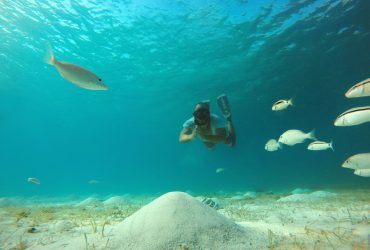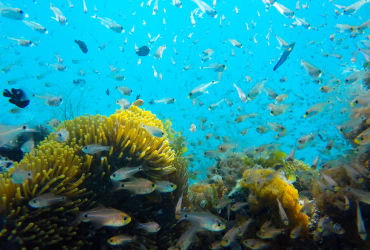February is a great time to get out and about in the island. Of course, the weather might determine what you can and can’t do on any given day, but that’s part of the attraction of visiting Fanjove!
Wildlife lovers might be interested in spotting bottlenose dolphins, dive behind the reef around infinite numbers of fish and see what other signs of wildlife can be found in the area:
watch a video of a curious octopus, of the symbiotic relationship between a sea urchin and a crab, of the beauty of snorkeling in the sandy waters in front of the dining and of Fanjove seen from above by a drone.
Depending on the tide and direction of weather, you can find a great variety of birds on the accumulated beaches and in the waters to either side.
On the sea, look out for ospreys, frigate birds, egrets as well as hundreds of crab plovers at this time of year. Onshore you can sometimes find waders like sanderlings, sand plovers and sandpipers feeding busily at the water’s edge.
With the return of sardines, the terns are fishing gracefully just offshore – a beautiful sight on a calm evening.
Add to this a range of crabs and oysters, and ocean plants including sea grasses and seaweeds.
All in all, a remarkable wildlife-watching opportunity.
Fanjove’s raw natural beauty makes it perfect to photograph, whether it is the stunning coral cliffs, or the tranquil reflections on a calm day.
Come chase the setting sun, especially at this time of year, as the low winter sun shows off at its absolute best.
Almost anywhere you go in Fanjove you will be surrounded by beautiful views. Step out onto the sand banks in turquoise and emerald waters at low tides, or head to the north end for a sight of the towering birds’ rocks. An excellent path will take you all the way, treating you to stunning views of the neighboring island of Songo Songo and to the wisdom tree.
Thank you for taking the time to read our latest newsletter – hopefully there has been something to inspire you to make a visit to Fanjove, for a short trip or a more permanent stay.
Hassan, Hakim and the Fanjove Private Island team.

cuttle

behere3-copy

bydrone

cuttle2

fd4

snorkeling
And some respite for the animals has finally arrived with 80 and 90 mm of scintillating rain. The green grass and tree buds have popped up all over. The water is flowing into the Lake and the noises around Lake Manze are back to normal. Birdlife prolific.
Our large hippo friends are normally found in the Lake as they laze about in pods with their extended families. One late afternoon a hippo came to visit us in camp as it slowly ambled up to the bird bath for drink. One of those right place, right time moments. Watch the video of the hippo in camp.
Elephants in and around camp have been amazing. These gardeners have trimmed and shredded their natural garden here in camp to their hearts content. We have had groups of up to twelve Elephants, big and small, working in unison to keep the landscaping of our gardens on track. Baby elephant sweet to his mum video. Itchy trunk video. Mock fight video.
Lions have come, gone and returned as they followed the herds of Zebra and Wildebeest onto higher ground tracking their dinner into the unknown. Watch the video of a lion cub walking in the camp by night and caught by our camera trap. Watch the video of a panting male lion in the heat of Selous.
The Manze pride was seen next to the main road after gorging themselves on a Kudu while on their trek back the Lake Manze. Special to see how the mother gives the young cubs the duty of preparing the meal before the feast. It seems they still have a lot to learn including the art of patience. Watch the video of lions cubs practicing with an alive prey (the content of this video may be disturbing to some viewer) and the one of the mother calling the cubs.
Wild dogs were seen this month watch the video by our guide Zacharia Mligo where is clear how pack cohesion and planning make them formidable hunters as they move to ambush their intended prey.
We are in the fortunate position that we are able to host some of the teachers from the National Tourism College on a complimentary basis here at Lake Manze Camp. These are the educators that teach the upcoming hospitality industry staff the theoretical knowledge they need for their future endeavors. They get an insight into what their students will experience and learn. We also host the students in camp for a three month stint to get their much needed practical experience. A combined knowledge base that will lead them on their chosen career path.
We congratulate all our staff on the many compliments received over this season so far and for their dedication we thank them.
Safe travels,
By Shaun, Milinda and all Manze Team.

National-Tourism-college-teachers-Salome-Lugata-and-Kuyungi-Kenipher2

Afternoon-nap

Barely-hiding

Big-Buffalo

Brown Hooded KingFisher

Buffalo-snacks

Cub-hiding-behind-a-branch

Ellie-hiding-behind-a-palm-leave

Eyeing-us-out

Green-(1)

Green-(2)

Lamp-inspector

Lion

Male-Lion

Monkey-business

National-Tourism-college-teachers-Salome-Lugata-and-Kuyungi-Kenipher1

National-Tourism-college-teachers-Salome-Lugata-and-Kuyungi-Kenipher4

On-her-way-to-the-water

Still-napping

Water-in-the-Lake

White throated Bee-Eater

Wildebeest-in-attendance
This month we have seen the full transition of the park in to the “green season” as heavy showers of rain up in the escarpment had the sand rivers thundering down and flowing out in to the Great Ruaha River which also started to flow once again. The rain this month has finally had the grass growing properly and wildflowers can be found popping up among the tall grass.
Watch the video of Mdonya’s waterfalls, its roar can be heard from the camp!
Around camp we have been surprised to see an increasing about of waterbuck who walk past on a near daily basis. Another newcomer has been a white baby baboon, other young baboons of the same age are generally very dark which makes this one stand out even more. Interestingly its eyes are not pink so it doesn’t appear to be full albino, it will be interesting to see how he develops as he grows older.
Sikio Mbovu continues to visit camp and always makes sure that his presence is noted by getting up to his little tricks, he is sometimes accompanied by a few other young elephant bulls. On one morning we had two guests have a very memorable wake-up call by one of the young elephants as he was tearing at the grass just under their tent window!
Game drives have been rewarding with sightings of lions on kills, leopard, cheetah and even a sighting of the wild dogs. Watch the video of a lioness playing with a stick.
Now that the green season has set in the bird life is prolific and you don’t have to be a ‘twitcher’ to appreciate the beauty and variety of birds around.
Safe Travel,
By Rebecca, Andrea and all Mdonya Team.

african-monarch

afterthedrink

Baboon-troop

black-backed-jackals-a-couple

black-headed-weaver-preparing-the-nest

black-headed-weaver-preparing-the-nest2

black-headed-weaver-preparing-the-nest3

black-headed-weaver-preparing-the-nest4

bush-buck

do-not-overtake-us

drinking-lioness

elephant

elephants-in-the-green

giraffe-crossing

i’ll-see-you-when-you’ll-see-me

lioness

Mdonya’s-waterfalls

Mdonya’s-waterfalls2

off road prohibited

opportunism

pin-tailed-whydha

portrait-with-ticks

showing-the-fitness

souther-ground-hornbill

juvenile-little-bee-eater